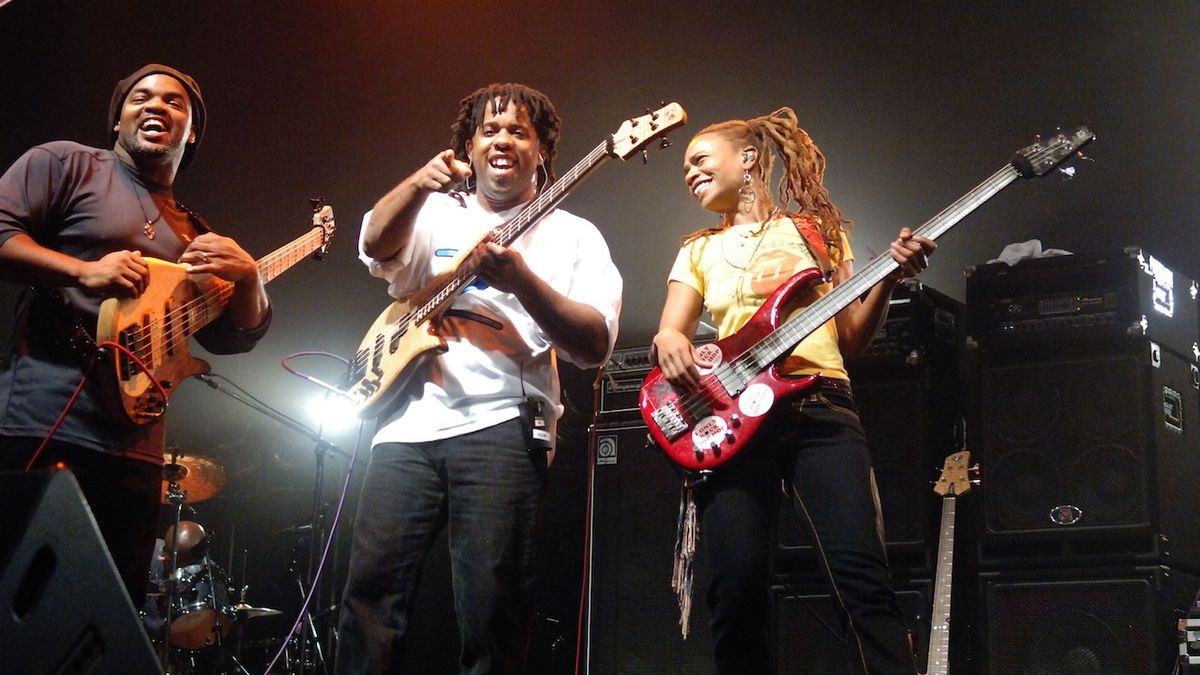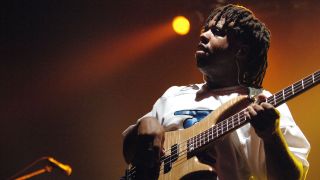“The word on the street was, ‘No-one could be playing that without overdubs.’ Well, the secret’s out. I’ve come clean”: Still copping Victor Wooten’s 20-year-old bass licks? You’d better take another look
Victor Wooten reveals the musical formula behind his 2005 solo album, Soul Circus

Anyone who’s followed Victor Wooten's career path is certainly accustomed to surprises by now. There were the technical fireworks, acrobatic backflips, and bass spins of early Béla Fleck & the Flecktones shows; the jarring reality of his overdub-free state-of-the-instrument solo debut, A Show of Hands; the genre-crossing spectacle of his solo tours; the blindfolded-walk-through-the-woods exercises at his Bass/Nature camps; and the refreshing musicality of a Bass Extremes tour with Steve Bailey and Oteil Burbridge.
And then there are Wooten's gut-check gigs as a sideman: he has barnstormed with Mike Stern's hardcore jazz unit, fingered an unlined fretless while reading Jaco charts with the Word Of Mouth Big Band, and gone phrase-for-phrase with such post-fuze shredders as Scott Henderson and Greg Howe.
But in 2005, just when we thought he had settled into his routine as a bass superhero, Wooten pulled out another surprise: a radio-friendly record! Soul Circus was unexpected, even for a Wooten release – from the pure pop on the recording itself, to the cover's eight-arm character, Funktopus.
“When A Show of Hands first came out, the word on the street was, ‘No-one could be playing that without overdubs – the guy has to have eight hands.’ Well, the secret is out; I've come clean.
“You may have thought the music was incredibly difficult to play, but it was actually not that hard for me because I do have eight arms, eight hands, and 40 fingers. I'm admitting it now; I hope people accept me.”
There's plenty of low-end to marvel at throughout; the bass-hero homage Bass Tribute is a sweet indulgence for us thumpers.
We spoke to Wooten on the eve of his 2005 U.S. tour, to talk about the album and the ensuing bells-and-whistles tour.
Get The Pick Newsletter
All the latest guitar news, interviews, lessons, reviews, deals and more, direct to your inbox!
Soul Circus isn't really a bass record.
“The focus is the songs, and I'm glad to hear you say that, because there's still a heck of a lot of bass on the disc – enough to keep the bass fans happy. There are plenty of tracks with three or four basses overdubbed, and there are some bass solos that are among my favorite that I've ever played. But the reason they're my favorites is they happen within the music.
“Throughout the album, I was just playing what I felt. I'm known for pyrotechnics, but it's really a small part of who I am. My main goal is always to make people forget I'm a bass player; it's just an instrument, a tool. If I do things well enough, I can make you forget about the bass guitar and focus on the music.”

Can you take us inside Bass Tribute?
“My goal was to write a song that pays respect to the bass giants whose shoulders I stand on, as well as the great contemporary players we all love. I started with a drum machine, the tenor bass riff at the top, and some lyrics, and then I added my brother Joseph's keyboards and J.D. Blair's drums.
“From there, I decided it would be great to get some bass buddies – we ended up with 11 – to help me sing. After each one sang, l'd ask them to name some of their favorite bassists, so the list and the lyrics kept growing. When co-producer Kurt Storey went to New York to record Will Lee, T.M. Stevens, and Christian McBride, I had only planned on them singing – but Will and T.M. added bass.
“Will pays tribute to Anthony Jackson, James Jamerson, and Willie Weeks, and T.M. does Bootsy. Steve Bailey did Ray Brown and Rocco Prestia, and I did Larry Graham, Stanley Clarke, Jaco, Marcus Miller, and a second Willie Weeks line.”
How did you come up with Prayer?
“Prayer is drawn lyrically from my dad's life, which had its share of turmoil due to his Korean War stint. In the bridge, I wanted a second prayer to the Lord's Prayer, so I had Bill Miller recite a Native American one. The song started as a 6/8 groove I came up with at a Flecktones soundcheck.
“Later, I wrote the chorus, which is in 4/4, and I like the contrast between the two feels. The bass on Prayer is my Taylor fretless acoustic bass guitar, which I recorded direct and mic'd acoustically.”
What are the bass sounds on your cover of Can't Hide Love?
“Can't Hide Love is my Fodera Yin-Yang 5-string – which has a high C string and a Yamaha MIDI pickup – through the Roland V-Bass, and then mixed with clean bass. I don't know the patch name; I just turned it on and scrolled to a sound I liked. It's sort of a light envelope filter. It definitely inspired my approach, which is why I like effects: they make you play differently.
“If you listen to my soloing closely, you can hear me going back and forth between knowing and not really knowing where I am in the changes. I kind of like that; I'll leave in mistakes if I've captured the vibe I was after. Someone once said, ‘You can miss the note, but don't miss the point.’”
What about Cell Phone?
“Cell Phone is a strange one to explain. The background music comes from a recording I made of the rhythm section – including me on upright – playing Soul Circus. I was fast-forwarding through it on my DVD player, and the resulting chopped up sound was so funky, I brought my DVD player downstairs and recorded and looped a portion. That's what you're hearing on Cell Phone.
“I also put the cell phone ring sound on my MIDI 5-string, and at the end of the track I'm soloing using that sound. The song was a longtime idea of mine, and we had fun creating all the characters.”
Back to India has a Sting-like, world-pop presence and radio-ready lead vocal by Speech from Arrested Development.
“Speech's voice is precisely how I'd like my vocals to sound, if I could sing! The song came about on the spur of the moment. I had two Indian percussionists in the studio, playing a clay pot called a ghatam, a small tambourine called a kanjira, and a jaw harp.
“We had just finished Stay, and I got this groove in mind. I grabbed a bass and went in with them, and I said, ‘I don't have a form yet, but I'll nod when the sections change – I was making it up on the spot.”
“Later, I overdubbed fills on my ‘sitar bass,’ which I got from a friend of Béla's, when the Flecktones played at the Birchmere in Virginia. It looks like a fretless Steinberger; Béla put banjo strings on it and rigged the neck so that the strings lie on the fingerboard in the upper register, giving those notes a buzzing, sitar-like sound.”
Higher Law echoes Sly Stone's rock-funk protest anthems.
“That almost didn't make the album, mainly because I didn't like the way I sang it – but Joseph and the rest of the guys loved the raw, Sly Stone vibe, so I left it as is and put it on.
“Raymond Massey, a great drummer who works for Pearl drums, was at my place recording, and I got this idea for a New Orleans-like march groove. At first I thumbed the groove with him, but it sounded better without the bass, so l put down a counter part instead. That became the verse section.
“Later, I was messing around and I came up with the rock hook. I love playing heavy rock in a Billy Sheehan style, and I rarely get to do it. The raw bass sound is my Fodera NYC with a dying battery, so it's on the verge of distortion.”
Ari's Eyes may be your finest instrumental ballad to date. What inspired it?
“The song originated the day before the 2002 Drum & Bass Collective show in New York. I knew I had a solo spot and that everyone would be expecting fireworks, so I wanted to do the exact opposite. I came up with the progression and improvised on it at the show.
“When I went to add a melody so I could use the tune on this album, it came real fast, which proved a theory of mine: A song is already finished before you write it. You're job is just to get to that point. It's almost like when you take a long walk – the destination is already set, and you just have to arrive there.
“Now my personal preference is to take that journey with the musicians who will be recording with me. I rarely, if ever, have a track laid out with exactly what everyone is going to play; I just have a general plan in mind, because I like to rely on the creativity of great musicians to finish the song as we go.
“In this case, I can't imagine Ari's Eyes without the contributions of Howard Levy's mournful harmonica, or Steve Bailey's fretless in the bridge.”
The title song sounds like audio proof of Funktopus!
“The first thing I had was the upright groove. Joseph, J.D., and I tracked the chord progression, and later I came up with the weird melody – no doubt inspired by the gigs I've done with Mike Stern. Then I harmonized the melody with a part above and a part below, which I overdubbed ... er, played with my extra arms!
“My cousin, M.C. Sookie, wrote and performed the rap, and the scat at the very beginning is my drummer friend, Kelly Gravely. He's really good at imitating a bass with his voice; he was over recording one day, and he did an imitation of my playing. I recorded it and used it for the beginning and end of the track. Then I learned what he scatted, and at the end, I play it along with him.”
And Funktopus?
“Of course. Come to a show and you'll see my eight arms – which, by the way, really comes in handy for signing autographs!”
Chris Jisi was Contributing Editor, Senior Contributing Editor, and Editor In Chief on Bass Player 1989-2018. He is the author of Brave New Bass, a compilation of interviews with bass players like Marcus Miller, Flea, Will Lee, Tony Levin, Jeff Berlin, Les Claypool and more, and The Fretless Bass, with insight from over 25 masters including Tony Levin, Marcus Miller, Gary Willis, Richard Bona, Jimmy Haslip, and Percy Jones.

“Please tell the bass players of the world to go easy on me. I did my best to represent you well!” Bob Rock made bass history on Metallica’s St. Anger – quite a feat, since he “never really played bass” before

“I was playing a lot of jazz when we did Longview. I’d sit in at jazz clubs and read off the Real Book”: If you think Mike Dirnt is another clueless punk, think again
Most Popular













